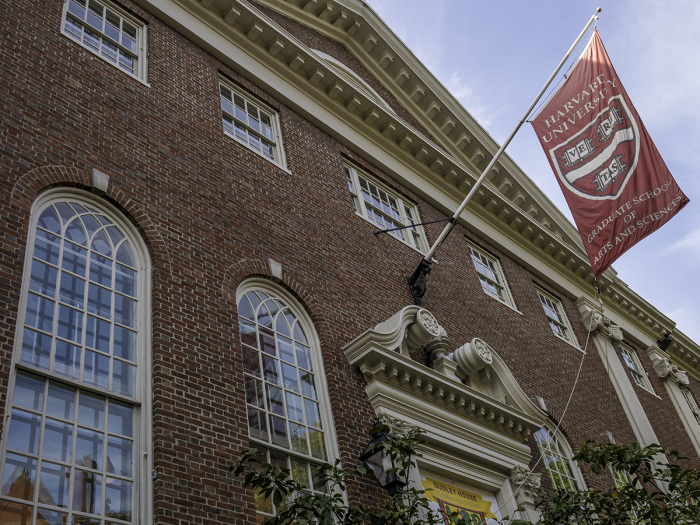
Harvard University is suing the Trump administration over its freeze on grants to the Ivy League schools as part of what the government says is an effort to eliminate antisemitism and diversity, equity, and inclusion policies on college campuses.
In a letter to the campus community published Monday, Harvard President Alan Garber announced that the school filed a lawsuit over the funding freeze, putting $2.2 billion in multi-year grants and $60 million in multi-year contracts on hold.
The complaint, filed in the U.S. District Court in Massachusetts, asks a federal judge to declare the funding freezes unlawful and deem demands outlined in two separate letters to the university as conditions for maintaining federal funding unconstitutional.
The university maintains that the government’s action violates the First Amendment to the U.S. Constitution and the Administrative Procedure Act.
The U.S. Department of Education’s Joint Task Force to Combat Anti-Semitism announced the funding freeze in a statement on April 14 after the university said three days earlier it would not comply with the administration’s demands.
The demands include the implementation of merit-based hiring and admissions policies and the abolition of “all preferences based on race, color, religion, sex, or national origin” by August.
The Trump administration urged Harvard to reform its “recruitment, screening, and admissions of international students to prevent admitting students hostile to the American values and institutions inscribed in the U.S. Constitution and Declaration of Independence, including students supportive of terrorism or anti-Semitism.”
The university was instructed to promote “viewpoint diversity” in admissions and hiring, conduct an audit of “programs with egregious records of antisemitism or other bias” and eliminate DEI programs and initiatives on campus, reform student discipline procedures to prevent “disruptions or deplatforming” in the future.
Harvard was also told to expel students responsible for the Oct. 18, 2023, assault of an Israeli business student.
Garber condemned the demands in the letter as “illegal.” Although he said that concerns about rising antisemitism are “valid,” the university president said that the law requires the government to “engage with us about the ways we are fighting and will continue to fight antisemitism.”
“Instead, the government’s April 11 demands seek to control whom we hire and what we teach,” Garber wrote.
In its April 11 letter, the Department of Education insisted that an “investment is not an entitlement.”
“It depends on Harvard upholding federal civil rights laws, and it only makes sense if Harvard fosters the kind of environment that produces intellectual creativity and scholarly rigor, both of which are antithetical to ideological capture,” the letter reads. “Harvard has in recent years failed to live up to both the intellectual and civil rights conditions that justify federal investment.”
Garber insisted that Harvard intends to take “concrete steps to reaffirm a culture of free inquiry, viewpoint diversity, and academic exploration; making changes to our disciplinary systems so they will be more consistent and more effective in ensuring that our students, faculty, and staff take responsibility for their actions; implementing measures to ensure that all members of our community are safe and respected; and adopting important adjustments to the way we build community.”
Another “priority” for Harvard going forward, Garber said, is “continuing to focus on individuals and their unique characteristics rather than race.”
This comment refers to affirmative action policies, prioritizing students from certain racial backgrounds in the admissions process. In the 2023 decisionStudents for Fair Admissions, Inc., v. President and Fellows of Harvard College, the U.S. Supreme Court ruled that Harvard’s use of affirmative action in its admissions policies violated the U.S. Constitution.
The Trump administration’s demand letter to Harvard comes after anti-Israel protests broke out on campus following the Oct. 7, 2023, terror attacks in Israel perpetrated by Hamas that left nearly 1,200 people dead, including over 40 Americans, and resulted in hundreds of people taken hostage.
The funding freeze also comes as the Trump administration has made cracking down on diversity, equity, and inclusion an important priority.
In March, the Equal Employment Opportunity Commission warned that DEI “initiatives, policies, programs, or practices may be unlawful if they involve an employer or other covered entity taking an employment action motivated — in whole or in part — by an employee’s or applicant’s race, sex, or another protected characteristic.” The EEOC cited the Students for Fair Admissions decision as the basis for its determination.
In February, the U.S. Department of Education pulled over $600 million in contracts to teacher preparation programs that advanced “inappropriate and unnecessary topics,” including DEI. The Trump administration has given states until Thursday to restrict DEI practices in schools or risk losing federal funding.
“The consequences of the government’s overreach will be severe and long-lasting,” Garber argues. “Research that the government has put in jeopardy includes efforts to improve the prospects of children who survive cancer, to understand at the molecular level how cancer spreads throughout the body, to predict the spread of infectious disease outbreaks, and to ease the pain of soldiers wounded on the battlefield.”
“As opportunities to reduce the risk of multiple sclerosis, Alzheimer’s disease, and Parkinson’s disease are on the horizon, the government is slamming on the brakes,” Garber added.
“The victims will be future patients and their loved ones who will suffer the heartbreak of illnesses that might have been prevented or treated more effectively. Indiscriminately slashing medical, scientific, and technological research undermines the nation’s ability to save American lives, foster American success, and maintain America’s position as a global leader in innovation.”
Ryan Foley is a reporter for The Christian Post. He can be reached at: ryan.foley@christianpost.com


















